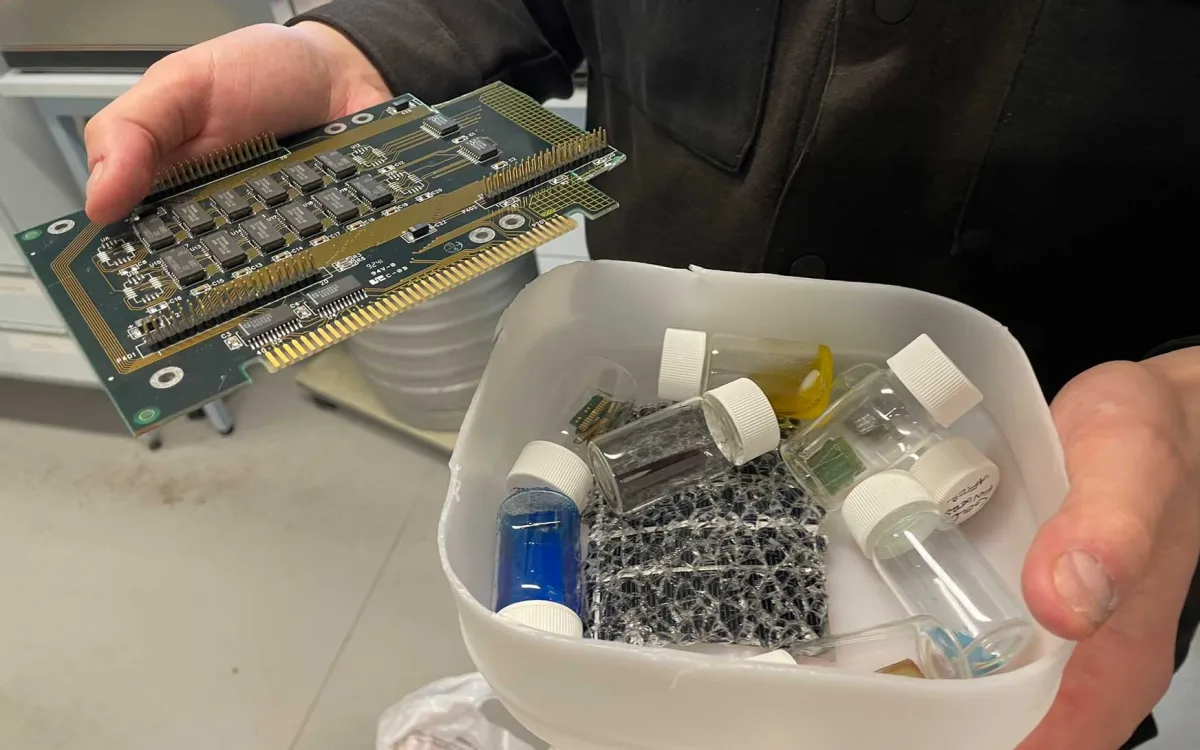In a recent study published in the Chemical Engineering Journal, researchers from the Universities of Helsinki and Jyväskylä developed a novel method that allows for the utilization of substances such as cooking oil from fast-food establishments to extract and isolate silver. This process necessitates the use of light and diluted hydrogen peroxide. The technique facilitates the reliable sourcing of silver while also minimizing environmental impact.
 Electronic waste contains precious metals, which can be safely dissolved and separated with recyclable fatty acids, without the use of corrosive substances. Image Credit: Riitta-Leena Inki
Electronic waste contains precious metals, which can be safely dissolved and separated with recyclable fatty acids, without the use of corrosive substances. Image Credit: Riitta-Leena Inki
A new method makes it possible to dissolve and separate silver using cooking oil from fast-food restaurants. Light and diluted hydrogen peroxide are needed for the procedure. By using this method, the environmental impact can be reduced, and the silver supply can be guaranteed.
Recycling silver from waste materials is becoming increasingly important for securing the supply of this precious metal. It is highly desirable to design new sustainable separation and recycling strategies to replace current processes that strain the environment.
Anže Zupanc, Postdoctoral Researcher, University of Helsinki
Even though the green transition is increasing the amount of silver-containing waste, less than 20% of the silver produced each year is recycled. For instance, solar panels contain silver. The amount of mineral resources that can be extracted through mining is also diminishing. Silver's price has increased sixfold in the last 25 years, making recycling it profitable.
Why Does Metal Dissolve in Fats?
The most widely used fatty acids, oleic, linoleic, and linolenic, were mixed with a 30% aqueous hydrogen peroxide solution as a mild green oxidant to dissolve silver. The fatty acids served as a medium and stabilizing ligands for the silver ions, and this mixture successfully dissolved silver into them.
“Computational chemistry enabled us to understand the solubility of metals by investigating the effect of solvents on the thermodynamics of dissolution,” said Professor Karoliina Honkala from the University of Jyväskylä.
The findings allowed for the clarification of whether a thermodynamic barrier or surface passivation is to blame for metals' insolubility. It was possible to separate the recyclable silver carboxylates from the unreacted fatty acids by adding ethyl acetate to the silver–fatty acid solution.
In a light-assisted reduction reactor, which is a safe and effective way to separate silver, the silver carboxylates were then reduced to metallic silver.
Toward Urban Mining
The goal of our research is to develop metal recycling techniques from multi-metal substrates using strategies that are inexpensive, sustainable, and selective by design.
Timo Repo, Professor, University of Helsinki
There are numerous advantages to using fatty acids as solvents as opposed to conventional mineral acids and aqueous solutions. They come from waste materials and are non-volatile, biocompatible, biodegradable, and low in acid. Compared to other acids and organic solvents, this makes them safe and non-corrosive, allowing for recycling and reuse.
Ethyl acetate and other antisolvents can be used to separate metal compounds from unreacted reaction mixtures because fatty acids are not water-based. This enables the recycling of fatty acids as well as simple metal recovery.
Furthermore, urban mining, the process of extracting, for instance, silver from keyboards that have waste silver plating, is made possible by the potential to use 30% aqueous hydrogen peroxide as a green oxidant in mild conditions.
Journal Reference:
Zupanc, A., et al. (2025) Sustainable urban mining of silver with fatty acids. Chemical Engineering Journal. doi.org/10.1016/j.cej.2025.162129.